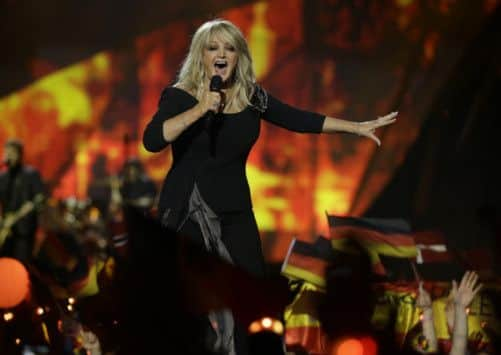Eurovision 2013: the songs may be over but the multi-nation malady lingers on


It’s gone midnight in Malmo in Sweden and hundreds of journalists are waiting patiently in a huge press conference hall for the arrival of the young woman who’s just won this year’s Eurovision Song Contest.
As millions of UK viewers breathe a sigh of relief that the lengthy spectacle is over for another year and head to their beds , eager reporters from across the continent are lining up to fire a barrage of questions at 20-year-old Emmelie de Forest from the country next door; Denmark. Her song Only Teardrops has won with 281 points, nearly 50 points ahead of Azerbaijan, the winner in 2011.
Advertisement
Hide AdAdvertisement
Hide AdIt’s the culmination of an event that’s taken over the city for the past fortnight.There’s been a Eurovision village in the centre of Malmo with live music, bars and shops. Eurovision songs past and present have filled the air. Groups of fans have wrapped themselves in their national flags. On the day of the final. a party of young men from the UK wander around wearing Union Jack onesies.


Contestants have been holding regular press conferences in the build up to the big night. The meaning and motivation of the entries is explored with the same degree of interest as the launch of a new policy in the heat of a general election campaign. Earlier in the week, France’s Amandine Bourgeois was asked “your official video is very angry and dark... does this reflect your attitude towards love?” She replied that in her video she’s “a witch, a nice witch who loves men”.
Camera crews, radio reporters and print journalists surround the artistes and members of the delegations from the participating countries as they move through the aircraft hanger like press centre straining to hear their every word.
Even before the main event goes live to millions of viewers, there is plenty to dissect with the results of the two semi-finals denying a dozen countries the chance to shine in the grand final.
Advertisement
Hide AdAdvertisement
Hide AdIn this part of the world, Eurovision is a serious business. It’s the homeland of ABBA. Enough said. Swedish photographer Stig Jonsson remarks that “it’s very important in Sweden. We’ve got five different competitions before they go to a final and then decide the champion. I heard someone has selected Bonnie Tyler and that is an odd way”.
That someone is the BBC and along with the rock legend they’ve asked the estimated global audience of around 120 million to believe in her with her power ballad Believe in Me. Some did but sadly not enough. The 61-year-old Welsh singer, who first hit the charts in 1976 with Lost in Franc”, ended up losing in Malmo, coming 19th out of 26 entries with 23 points.
In these troubled Eurovision times for the UK, that’s not as bad as it might have been. Last year, Engelbert Humperdinck came second to last. Afterwards, Bonnie said “I’m sure a lot of people will be disappointed on my behalf but I have really enjoyed my Eurovision experience. I did the best I could with a great song”.
So what can be done to get the UK back in the game? Ardent fan Nicky Teare, a 37-year-old accountant from Sheffield says: “If we took it a bit more seriously, we would do better. People in the UK have the view that it’s all political and its not. If you’ve a got great song you do well.”
Advertisement
Hide AdAdvertisement
Hide AdHe’s keen to remind jaded viewers that the UK came fifth in 2009 with Jade Ewan’s rendition of Andrew Lloyd Webber’s It’s My Time.
However, a new survey confirms the British public’s Eurovision scepticism. The You Gov survey reveals that 75 per cent say some countries do not have a real shot at winning the annual talent contest because of political voting by the other competing nations. So what can be done to persuade the UK audience that it’s a competition worth trying to win?
Just minutes after the show was over, die hard fan Roger Simpson, aged 47, from Scunthorpe was suggesting increasing the influence of the national juries whose votes currently make up half of the final tally. He says: “I think when you listen to the results what they’re really saying is the 12 points go to our friends and our neighbours. Something has to be done about that. Maybe change the percentage of the TV vote. Eurovision will keep using the TV vote because they keep making money out of it but maybe make it 60/40 or even 70/30 “.
Roger also has wish list of performers: “I think it needs to be someone who’s current and someone who appeals to the younger voters. It’s got to be someone who’s up for it and won’t have their career affected if they fail .”
Advertisement
Hide AdAdvertisement
Hide AdHis favoured choice is the Scissor Sisters. Band frontwoman Anna Matronic certainly knows all about the competition after being part of the BBC’s presenting team in Malmo . The band may be American, but so was Katrina of Katrina and the Waves, the UK’s last winner in 1997. And Canadian Celine Dion won for Switzerland in 1988.
Also musing on who might propel the UK back to the top is a Eurovision winner who’s got Sweden to thank for her place in the competition’s history. In 1992, Linda Martin won for Ireland in Malmo with Why Me, a song written by Ireland’s two time winner Johnny Logan. 21 years later though it’s a very different story for the Emerald Isle. Their young hopeful Ryan Dolan came last with Only Love Survives.
Linda’s keen on emphasising communication skills .”Once you hit the stage it’s about communication using the eyes, the smile down the cameras to the viewers . It doesn’t matter how good a singer you are or how good a dancer you are, if you haven’t got that communication. Robbie Williams has it. David Essex use to have it. “
At least Linda can talk from experience about what winning meant to her .”It was total amazement, like all your birthdays coming at once . It’s a realisation that you can get off the road with a covers band, which is what I was doing at the time, and go a couple of steps up the ladder. I knew I wasn’t going to be a superstar or a millionairess overnight or anything like that, but I just knew I could get off that treadmill... and that’s exactly what happened. It opened opportunities not only in Ireland and the UK but also in Europe. I never thought I’d get this longevity out of it to be perfectly honest but it just keeps on giving and giving.”
Advertisement
Hide AdAdvertisement
Hide AdLinda’s worried about the direction in which the Eurovision juggernaut is heading. “It’s big, it’s way too big. I cry over the lack of an orchestra because that is magic in itself for a ballad. I just think the staging is almost taking over the song. I’m not belittling this production or any production, they are spectacular. I just think it’s bigger than any of us. It’s not just a song contest anymore”.
One group who’ll never lose faith in the world’s largest non-sporting TV event is its ever-growing army of gay fans. The exuberant atmosphere on the packed trains heading towards the venue wouldn’t be out of place in a gay cup final. Nicky Teare says: “I think the reason over the last decade it’s become a bigger gay thing is there’s been a lack of really good pop songs in the charts and if you want a good fun pop song then you have to come to Sweden,” Linda Martin simply says: “It’s fun , it’s camp, it’s sequins, it’s sparkle”
Also happy to be a part of it, come what may, are Edward Evans, a 59-year-old banker and 46-year-old sales executive Jennifer Perry who’ve travelled all the way from Canada. Edward Evans has watched from its inception in the mid 1950s . For him, the politics of Eurovision strikes a more historically significant note. “For one night a year the whole of Europe speaks the same language in song and how could you not fall in love with that during the cold war. Peace and happiness”.
“What’s Another Year” sang Ireland’s Johnny Logan when he won in 1980. It’s a year when the powers that be at the BBC will no doubt have a re-think about how to tackle Eurovision 2014 in Denmark. Last time the TV spectacle was held in the Nordic country Sheffield’s Lindsay Dracass was doing her utmost for the UK belting out No Dream Impossible. She managed 15th.
Despite this latest disappointment Eurovision fans will continue to dream what seems to be the impossible dream – the UK regaining the Eurovision crown.